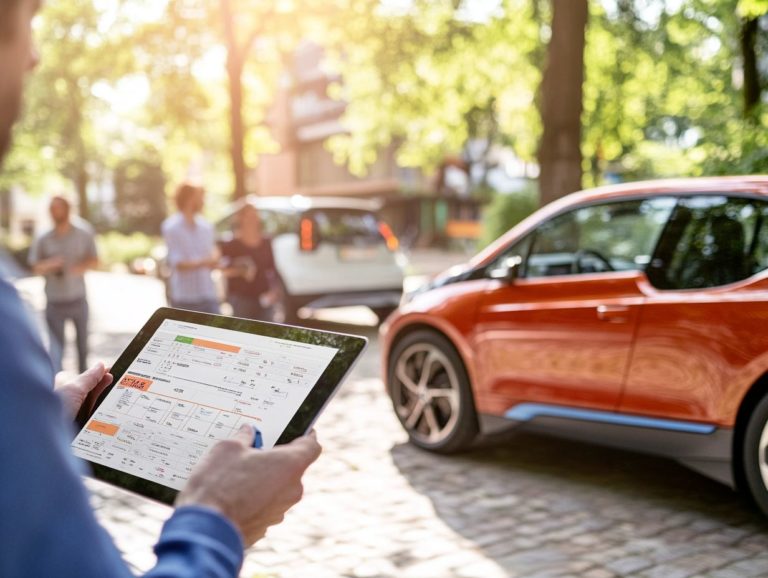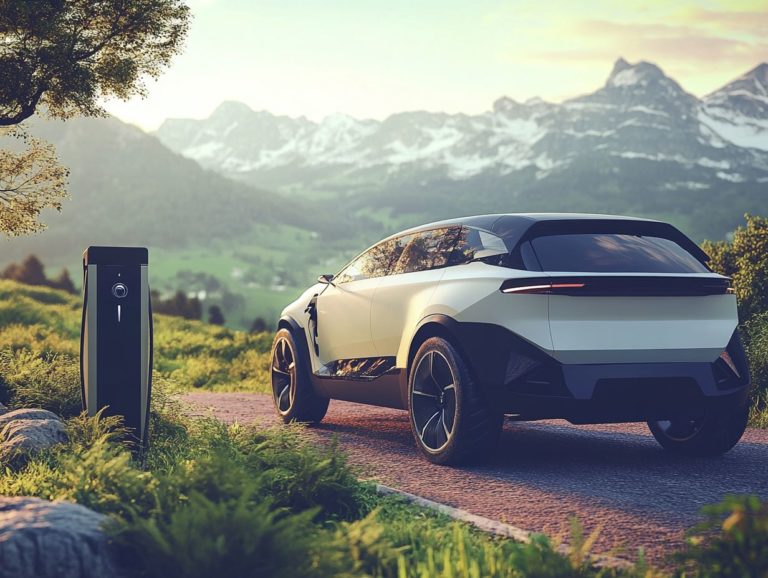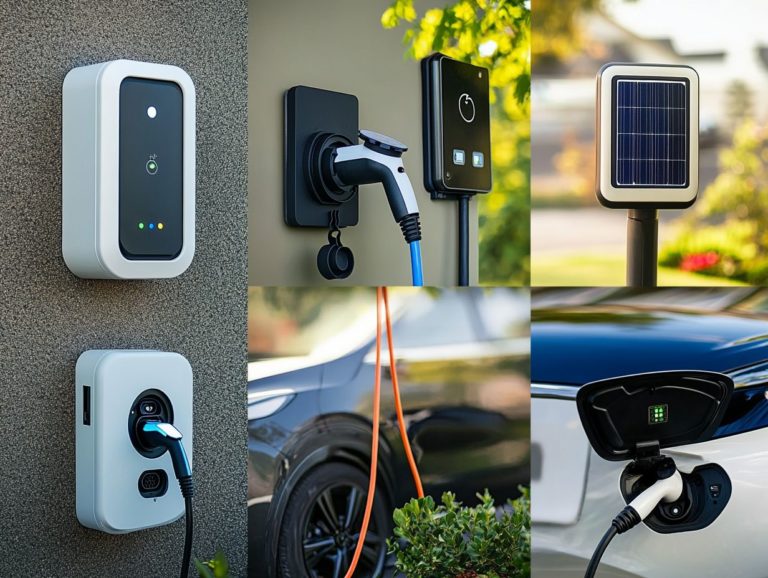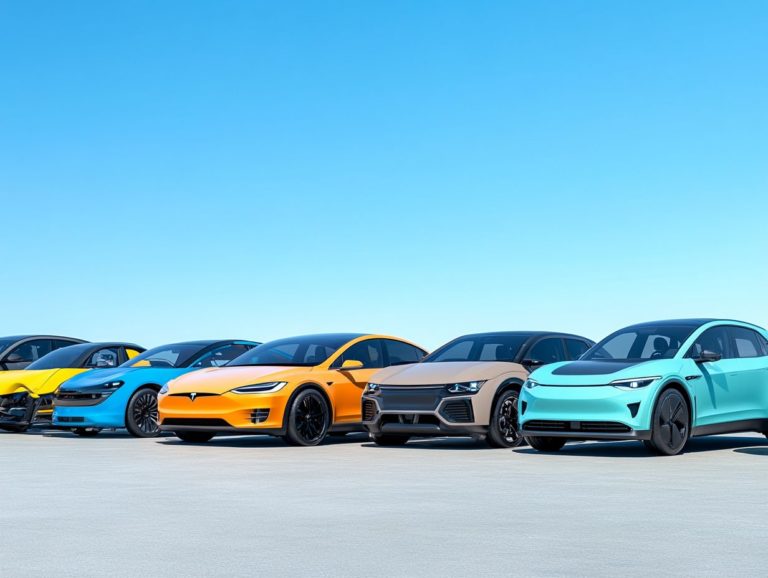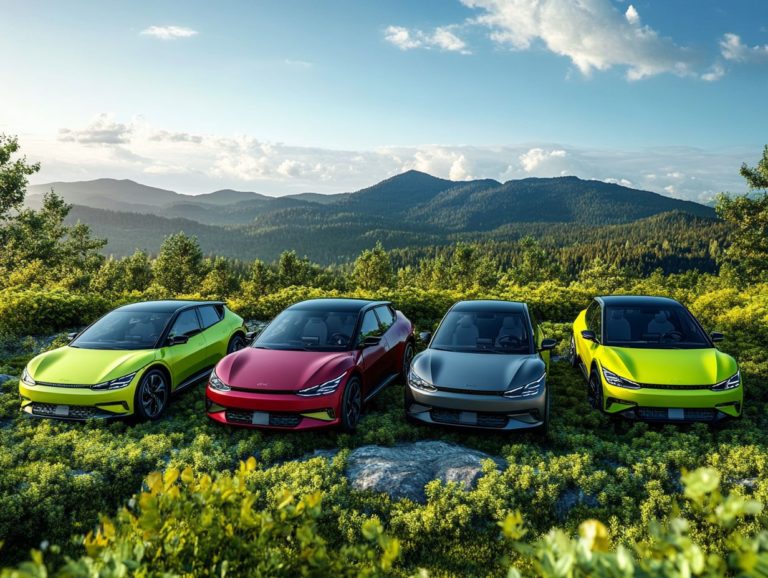How to Prepare for Your First Electric Car
As electric cars surge in popularity, you might find yourself contemplating the switch but feeling uncertain about where to begin.
This article serves as your comprehensive guide, illuminating essential information from the different types of electric vehicles to the numerous benefits of making the transition, including environmental advantages and potential cost savings.
This article also covers practical considerations, such as preparing your home for charging and modifying your driving habits, to ensure a smooth switch to your first electric car.
Contents
- Key Takeaways:
- Benefits of Switching to an Electric Car
- Factors to Consider Before Purchasing an Electric Car
- Preparing Your Home for an Electric Car
- Understanding the Different Types of Electric Cars
- Preparing for the Transition to an Electric Car
- Making the Switch to an Electric Car
- Frequently Asked Questions
- What is the difference between an electric car and a traditional gasoline car?
- What are the benefits of owning an electric car?
- Do I need to install a special charging station at my home?
- What kind of maintenance is required for an electric car?
- How long does it take to charge an electric car?
- Are there any government incentives for purchasing an electric car?
Key Takeaways:
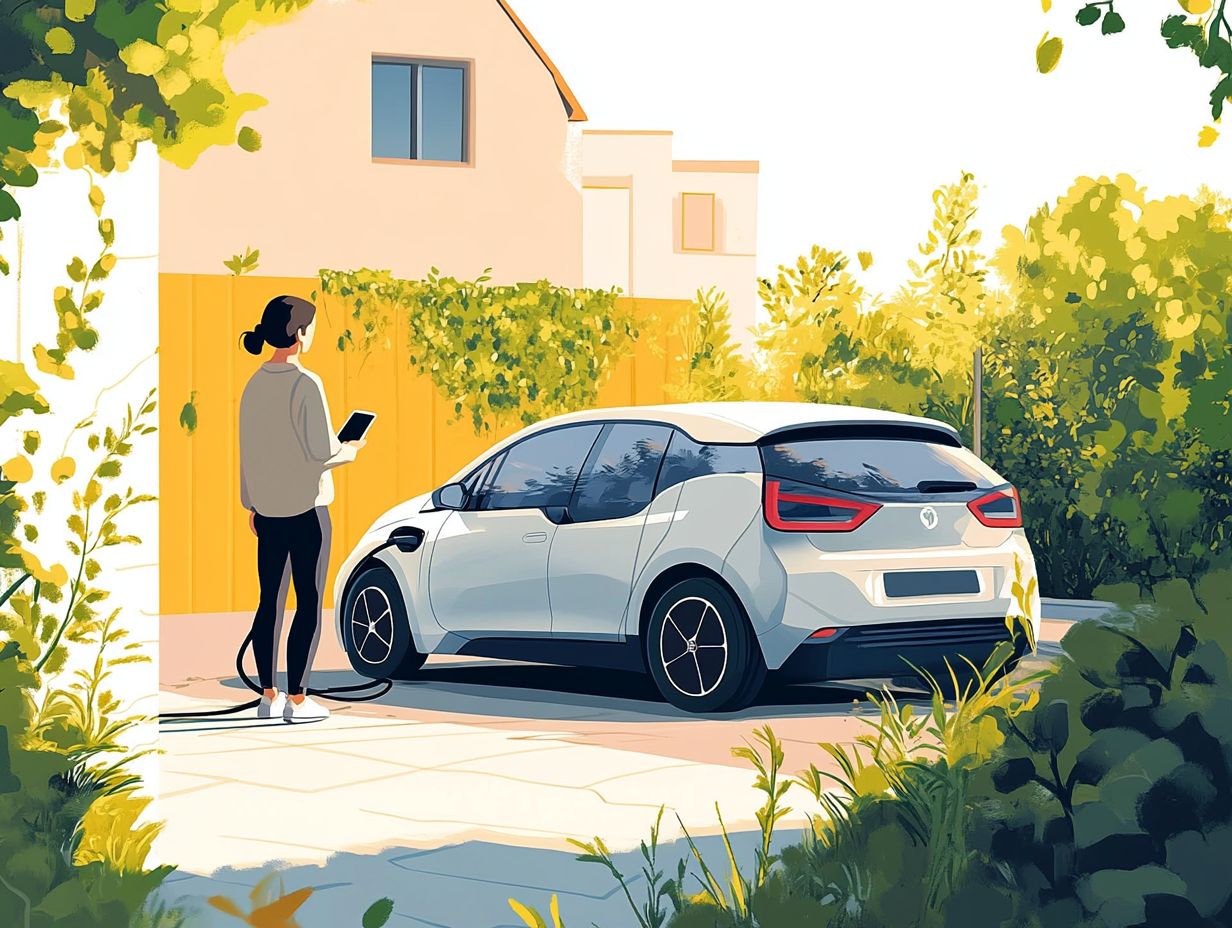
- Consider the environmental impact and potential cost savings when switching to an electric car.
- Prepare your home by installing a charging station and updating the electrical system.
- Learn about the different types of electric cars and adjust your driving habits for a seamless transition.
What are Electric Cars?
Electric cars, also known as electric vehicles (EVs), use modern technology powered by electricity to operate. They minimize emissions and promote sustainability. Unlike traditional gasoline-powered vehicles, models like the Tesla Model S, Hyundai Kona, and Jaguar I-PACE rely on electric motors and rechargeable batteries, offering an eco-friendly alternative for those concerned about energy costs and the environment.
The rising popularity of models like the Tesla Model 3 demonstrates how these vehicles provide impressive battery ranges, often exceeding 300 miles on a single charge. This helps to reduce range anxiety for many drivers.
Meanwhile, the Hyundai Kona offers a budget-friendly option while still providing a good range that appeals to a broad audience of eco-conscious consumers.
As EV technology continues to advance, it plays a crucial role in lowering carbon emissions, positioning itself as an essential ally against climate change and paving the way for a cleaner future. The automotive industry is constantly evolving, and these electric vehicles signify a vital shift toward more sustainable transportation alternatives.
Benefits of Switching to an Electric Car
Switching to an electric car opens a world of benefits, from significant savings on fuel and maintenance to a commendable positive impact on the environment.
As you consider your driving needs and energy use, the benefits of electric vehicles (EVs) become clear, especially in light of rising energy costs and the growing push for EV adoption.
Embracing this shift not only improves your finances but also aligns you with a more sustainable future.
Environmental Impact and Cost Savings
The environmental impact of electric vehicles (EVs) is significantly lower than that of traditional combustion engine cars, leading to cleaner air and reduced greenhouse gas emissions. Additionally, EVs offer substantial cost savings over time. Adopting electric cars aligns with the goal of mitigating climate change, making them an attractive choice for eco-conscious consumers.
Studies indicate that EVs can cut carbon dioxide emissions by up to 60% compared to gasoline-powered vehicles, showing how their widespread use can help create a healthier planet.
The cost savings associated with owning an electric vehicle are impressive; charging at home often costs much less than fueling with gasoline, with some estimates suggesting you could save up to 50% monthly.
Public charging stations further enhance this scenario, providing affordable options that frequently utilize renewable energy sources. This not only amplifies the environmental benefits but also reinforces the economic advantages of choosing electric over traditional transportation methods.
Ready to make the switch? Explore more about electric cars and how they can transform your driving experience!
Factors to Consider Before Purchasing an Electric Car
Before you dive into purchasing an electric car, it s wise to consider several key factors: battery range, available charging options, and overall maintenance requirements.
Reflect on your driving habits and typical charging scenarios. Will you be charging at home or relying on public stations? This understanding is essential to ensure that the electric vehicle (EV) aligns perfectly with your driving needs.
It will help keep your electric vehicle a cost-effective choice for the long haul.
Range, Charging Options, and Maintenance

When considering the transition to an electric vehicle (EV), you’ll want to weigh several key factors. These include battery range, charging options, and maintenance requirements. These elements can profoundly influence your overall ownership experience.
With recent advancements in EV software and infrastructure, you now have access to a variety of charging solutions. From home charging stations to an expanding network of public charging facilities, owning an electric car has never been more practical.
The battery range of a vehicle is particularly significant, as it determines how far you can travel on a single charge. This is essential for your daily commutes and longer journeys.
For urban drivers, the convenience of home charging offers peace of mind. It seamlessly integrates into your daily routine. Public charging options have grown considerably, providing quick solutions while you’re out running errands or embarking on longer trips.
Electric vehicles (EVs) change how you think about maintenance compared to gas cars. You ll find that the focus is more on software updates and battery health, redefining what it means to be a responsible owner.
Preparing Your Home for an Electric Car
Preparing your home for an electric car requires an understanding of charger installation requirements. Ensure that your electrical system can support home charging solutions. This thoughtful preparation allows for seamless recharging of your electric vehicle (EV) and optimizes your energy costs.
By taking these steps, you can make your transition to electric driving not just smoother, but significantly more efficient.
Installing a Charging Station
Installing a charging station at home is an essential move for electric vehicle (EV) owners. It enhances convenience and ensures efficient energy use while keeping your overall energy costs in check.
By leveraging the latest EV software, you can control your charging schedules, optimizing energy consumption based on time-of-use rates that can save you money.
There are various charging stations to choose from. You can opt for a standard household plug for a leisurely charge or a faster charging option that requires special installation for those busy days.
The installation process involves assessing your home s electrical system and may require permits, particularly for the more powerful chargers. The good news? Many local governments and utility companies offer incentives and grants to help offset installation costs.
As charging technology continues to evolve, integrating EV software simplifies the charging process and boosts energy efficiency. You could save on utility bills by taking advantage of off-peak pricing or by harnessing renewable energy sources.
Start planning your electric car journey today!
Updating Your Electrical System
Updating your electrical system is essential when installing a home charging station for your electric vehicle (EV). This step ensures that your infrastructure can handle the increased load while providing a safe and efficient charging experience. By investing in an upgrade, you enhance efficiency and have the potential to reduce long-term energy costs associated with charging.
To enjoy these benefits, consider several key factors. Start by assessing the current capacity of your electrical panel; it may need an upgrade to meet the higher power demand. Use dedicated circuits, which are circuits used only for charging your electric vehicle, to significantly improve charging speeds and safety. This reduces the risks of overheating or tripped breakers. Incorporate smart charging solutions and energy management systems to optimize energy usage during off-peak hours, ultimately helping you lower your electricity bills.
By making these essential updates, you can enjoy a more reliable and cost-effective EV charging solution tailored to your needs.
Understanding the Different Types of Electric Cars
Understanding the various types of electric cars is crucial for potential buyers. This knowledge enables you to select the vehicle that aligns perfectly with your lifestyle and driving requirements.
Consider the primary categories: battery electric vehicles (BEVs) and plug-in hybrid electric vehicles (PHEVs). Each category presents unique features and advantages, as seen in popular models like the Tesla Model S and the Hyundai Kona.
Making an informed choice ensures that your electric vehicle experience is tailored to your needs.
Battery Electric Vehicles vs. Plug-in Hybrid Electric Vehicles
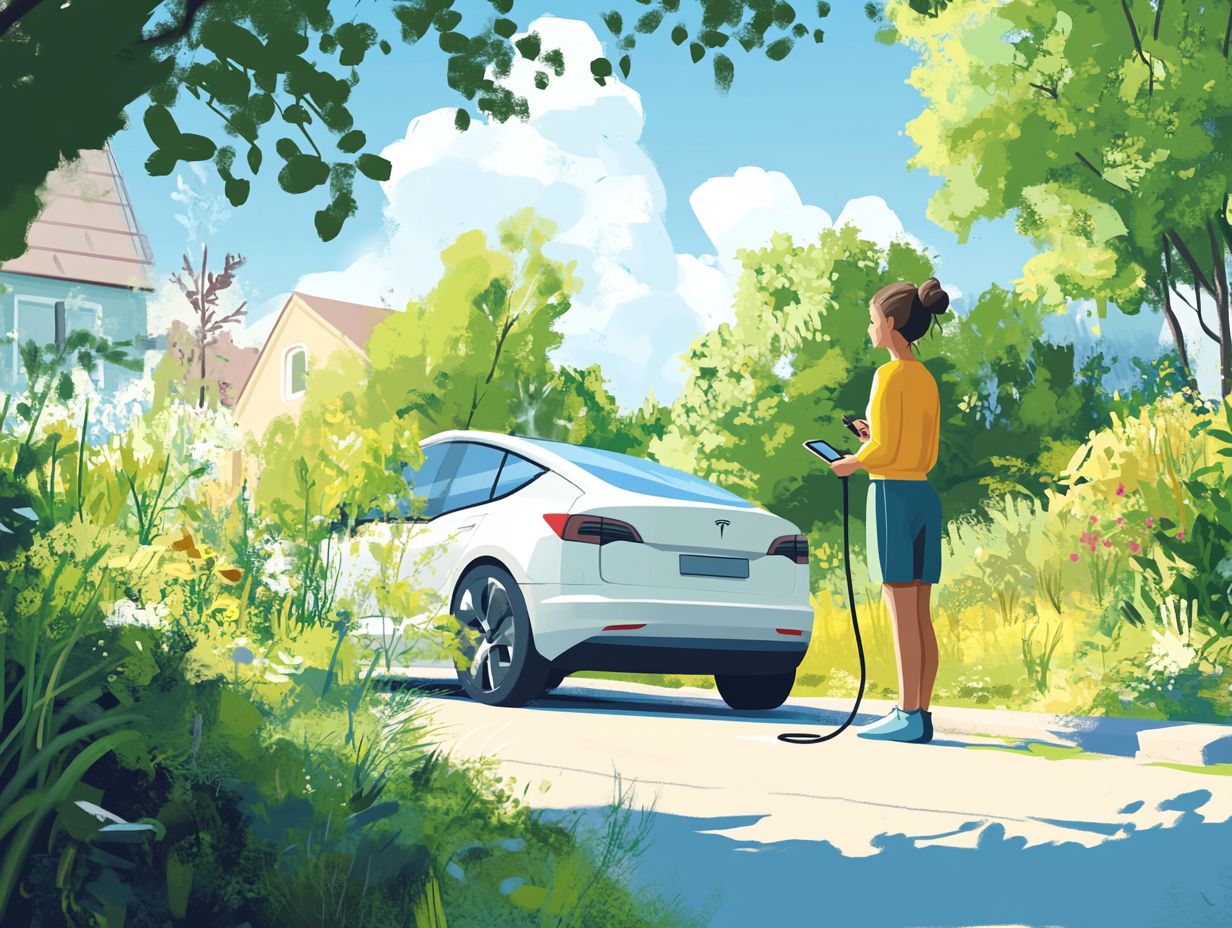
Battery electric vehicles (BEVs) run exclusively on electric power, using advanced battery technology for an impressive range. Plug-in hybrid electric vehicles (PHEVs) combine a traditional engine with an electric motor, offering an exciting blend of power and efficiency. The Tesla Model S and the Jaguar I-PACE showcase remarkable advancements in BEV technology, while the Hyundai Kona exemplifies the flexibility PHEVs offer.
The main differences between BEVs and PHEVs involve their energy sources and how they cater to your unique driving needs. BEVs are a more eco-friendly choice, producing zero tailpipe emissions, making them perfect for urban areas where air quality matters. They also require less maintenance due to their simpler mechanics compared to PHEVs, which still depend on traditional engines and their complexities.
PHEVs provide the advantage of extended range thanks to their dual-power systems, making them a solid option for those who may not be able to charge their vehicles daily. Understanding these distinctions helps you confidently choose the vehicle that fits your range requirements and lifestyle.
Preparing for the Transition to an Electric Car
Preparing for your transition to an electric car requires a shift in mindset and awareness of your driving habits, along with an understanding of battery range limitations. It’s also important to learn how to prepare for the EV boom in your city.
Engaging with communities such as the Tesla Owners Club and EV Society can provide invaluable insights during this transition. These platforms help you navigate your driving needs and adapt your habits to align with your new vehicle, ensuring a seamless and enjoyable experience on the road.
Explore electric vehicle options further and consider joining relevant communities for more information!
Mastering Your Electric Vehicle: Driving Habits & Range Awareness
Adjusting your driving habits is crucial as an electric vehicle (EV) owner, especially when navigating the range limitations of your new car. Use EV software and find nearby charging locations to optimize your experience and ease any range anxiety during your transition.
Planning routes that include charging stations can significantly enhance your driving experience. Understanding how far you can travel before needing to charge helps you manage your battery levels and avoid unexpected stops.
The latest EV software provides real-time updates that highlight the nearest charging options. This integration reassures you about your vehicle’s capabilities and creates a more enjoyable and less stressful road trip experience.
Making the Switch to an Electric Car
Transitioning to an electric car can be rewarding when you embrace the right mindset and preparation. Familiarize yourself with charging scenarios, leverage EV software, and apply practical tips for a smooth transition to fully appreciate the benefits of this groundbreaking technology.
Tips for a Smooth Transition
To ensure a smooth transition to your electric vehicle (EV), familiarize yourself with tips that can enhance your ownership experience. Understand charging situations, plan for battery range, and optimize your home charging setup to minimize inconvenience.
Create charging schedules that fit your daily life. This will help minimize any waiting time. It’s also wise to get to know the local charging infrastructure, identifying nearby stations, their charging speeds, and availability.
When preparing for longer trips, a charging plan will alleviate any concerns about battery life, transforming your journey into an enjoyable experience. Utilize apps that track real-time charging station status for peace of mind, making your transition to an electric vehicle seamless and rewarding.
Watch this video for essential tips on managing your electric vehicle!
Frequently Asked Questions
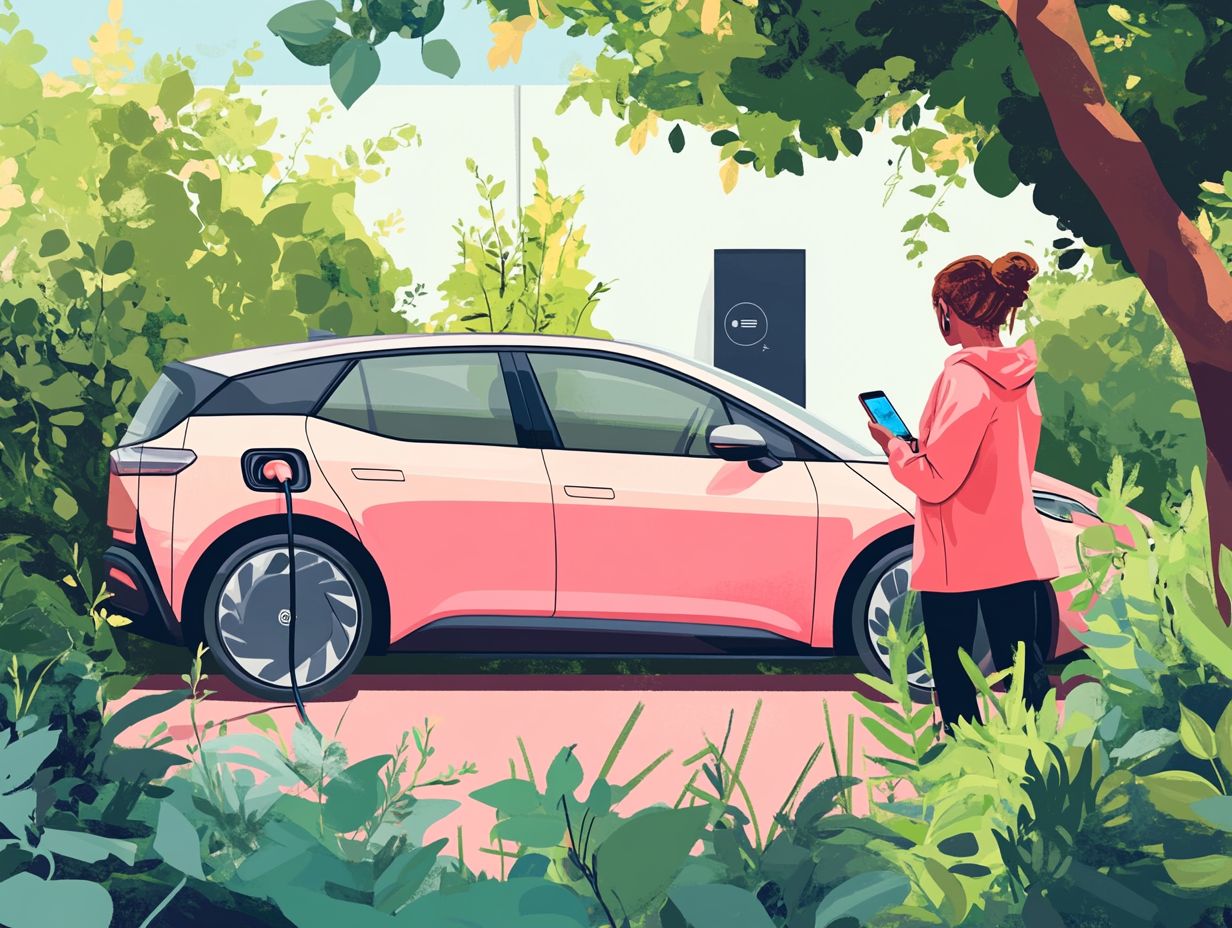
What is the difference between an electric car and a traditional gasoline car?
An electric car runs purely on electricity and does not use gasoline, while a traditional car runs on gasoline converted into energy for the engine.
What are the benefits of owning an electric car?
Owning an electric car can save you money on gas, reduce your carbon footprint, and provide a quieter and smoother driving experience.
Do I need to install a special charging station at my home?
Installing a Level 2 charging station at your home is a smart move for faster charging. However, you can also use a standard outlet depending on your charging needs and distance.
What kind of maintenance is required for an electric car?
Electric cars have fewer moving parts compared to traditional cars, resulting in minimal maintenance. Routine tasks include checking the battery, tire pressure, and replacing brake pads and wiper blades.
How long does it take to charge an electric car?
The time to fully charge an electric car depends on the battery size and charging method. On average, it takes anywhere from 4 to 12 hours.
Are there any government incentives for purchasing an electric car?
Yes, many governments offer tax credits or rebates for purchasing an electric car. Check with your local government for available incentives.

